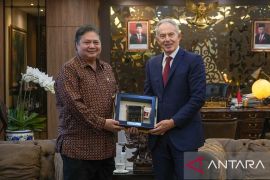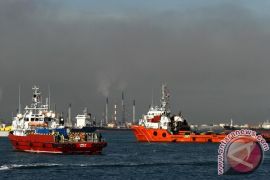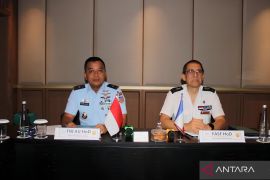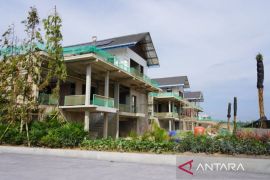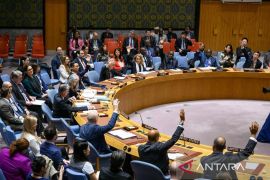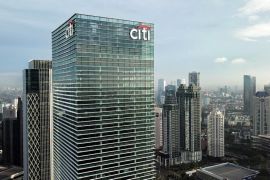They comprised diplomats, members of the international seaweed associations, the Coral Triangle Initiatives (CTI), the international ornamental fish associations, and chambers of commerce and industry, tour operators, NGO activists, academicians, researchers, scientists, as well as government officials.
"The WOBF is organized to demonstrate the Indonesian government's commitment to supporting marine preservation by the private sector," Saut Hutagalung, the maritime affairs and fisheries ministry's director general for fishery product marketing and processing affairs, stated while opening the WOBF.
During the forum, the participants shared information on business opportunities in the fields of marine and fisheries, which are based on the sustainable management of coral reef ecosystems.
"It is expected that during the forum businessmen will strike business deals on marine resource management and fishery products that can help to improve the people's welfare," he noted.
Hutagalung noted that the businessmen were invited to invest in managing and exploiting marine resources and fisheries by applying sustainable preservation principles of the ecosystem and the natural resources, such as coral reefs, seagrass, and mangroves.
The investment should be based on innovative and creative approaches and the Blue Economy framework, he added. The Blue Economic principles are natural resource efficiency or zero waste, multiple economic values, more manpower absorption, and social inclusiveness benefits.
"The forum will also be used as a platform by businessmen engaged in seaweed trading to discuss the preparations for an ASEAN's Senior Official Meeting (SOM) on cooperation in seaweed development in ASEAN, which will be held in Thailand, in June 2014," he added.
Besides the World Ocean Business Forum, the WCRC's other agenda include Senior Official Meeting of the Coral Triangle Initiative on Coral Reefs Fisheries and Food Security (CTI-CFF), International Blue Carbon Symposium, the Arafura and Timor Seas Ecosystem Action (ATSEA) Ministerial Meeting, and the CTI-CFF Ministerial Meeting which will be held on May 15, 2014.
On the sidelines of the conference, Coral Reef Exhibition is organized from May 14 to 17 at the Manado Convention Center (MCC).
Among 50 NGOs and institutions joining the exhibition are WWF, media corporations, the Indonesian ministry of maritime affairs and fisheries, and fishery industries.
The peak event, the World Coral Reef Conference, is scheduled to be organized on May 16 and officially opened by Indonesian Vice President Boediono. Initially, President Susilo Bambang Yudhoyono was scheduled to open the conference.
The WCRC is as a follow up of the World Ocean Conference (WOC) and the Coral Triangle Initiatives (CTI) summit which was also held in Manado in 2009 that issued the Declaration of Manado aimed at protecting and preserving coral reefs.
Coordinating Minister for People's Welfare Agung Laksono recently explained that the WCRC was expected to help promote sustainable utilization and management of coral reefs in a number of countries.
The WCRC is also aimed at promoting coral reefs as a future economic aspect for the international community and help encourage the international community to respect coral reefs as future food resources.
"It will promote the preservation of beaches that have coral reefs, such as those in Indonesia and other member countries of the CTI, to protect coral reefs from being damaged," the minister said.
The Coral Triangle Initiative (CTI) was established at the initiative of Indonesian President Yudhoyono on the sidelines of the December 2007 Bali United Nations Framework Convention on Climate Change (UNFCCC) talks.
The CTI programmes are primarily aimed at the protection and preservation of marine and coastal resources in six countries: Indonesia, Malaysia, Papua New Guinea, the Philippines, Solomon Islands, and Timor-Leste.
Home to more than 76 percent of all known coral species, 53 percent of the world's coral reefs, and over 37 percent of coral reef fish species, the Coral Triangle is one of the world's most biologically diverse regions.
As the initiator of CTI, Indonesia is an archipelago state located at the heart of the world's Coral Reef Triangle. Indonesia is one of the world's largest maritime countries with about 5.8 million square kilometers of marine territory.
The country is the global center of marine biodiversity with the most diverse marine ecosystems in the world, more than 500 species of coral, and at least 3,000 species of fish.
It has abundant renewable resources, such as fish, seagrass, coral reefs, and mangroves, as well as non-renewable resources.
The country also has the world's largest mangrove area and tuna larval rearing area. "The huge marine resources and fisheries potential must be managed and developed sustainably," Hutagalung stated.
According to Marine Affairs and Fisheries Minister Sharif C Sutardjo, the nation has developed a marine conservation area measuring 15.5 million hectares, close to its year 2020 target of 20 million hectares. (*)
(F001/A014)
Reporter: Fardah
Editor: Fardah Assegaf
Copyright © ANTARA 2014


